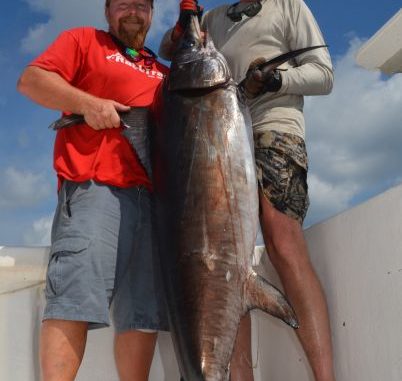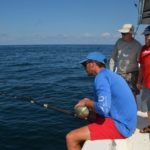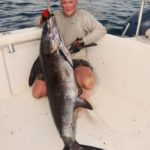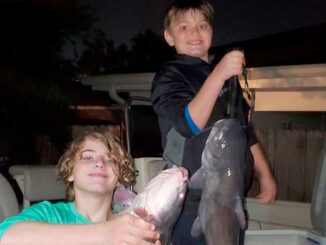
This Venice captain is, well, different. And that means he’s always looking for something new, so he’s on the forefront of recreationally caught swordfish. Here’s how he does it.
Xiphias gladius. Ahh; what a name for a fish!
Xiphius means “sword” in Greek, and gladius means “sword” in Latin.
The latter is also the root word for “gladiator.” A fish with a sword that fights like a gladiator — how could you not be hypnotized by the thought of doing battle with one.
Their swords aren’t the pickety little spikes marlin sport — they’re big, heavy, dense blades.
They have been known to sink boats with their swords, occasionally when they weren’t even hooked.
And they grow to well over a 1,000 pounds.
Yeah, speckled trout are fine, but this is really a sea monster.
I had wanted to write about catching swordfish for several years. I found a lot of guys who were willing, but not very successful; I found a few guys who were successful, but not very willing.
Then my path crossed with Peace Marvel’s (PeaceKeeper Charters, 504-858-8862). He was successful and he was (cautiously) willing.
I jumped on the first date he had available, a trip with regular customer Paul Cash of Warren, Ark.
It was a decent run to the spot Marvel wanted to fish, even out of Venice, which is hung way out into the Gulf at the end of the thumb of land formed by the Mississippi River.
Before he got to his chosen spot, the captain stopped the boat and scanned the horizon for other craft. One can never be too careful about divulging one’s hard-earned spots in this fishery.
Satisfied he was alone, Marvel steamed to his destination.
There, he and deckhand Justin Fayard put the finishing touches on their rig. Fayard carefully hand-over-handed the squid and detachable main weight, diamond lights and smaller secondary weight overboard, and ran the rig down.
The bottom was a long ways away. It took Fayard five minutes to reach it.
After jerking the main weight off, he reeled in a dozen or so cranks.
“Sometimes we reel it up two or three cranks and sometimes as many as 60,” the bearded captain explained.
Fayard stabbed the rod butt into a rod holder in the gunnel to fish dead-stick, without moving it until they got a significant bite.
And then the men settled down to wait.
Fayard straddled the rod and stared at its tip with an intense ferocity. Marvel, who remained at the helm with the motor running, matched Fayard with his own hypnotic gaze.
Sometimes the boat seemed to drift aimlessly; other times Marvel gently kicked it in gear.
It soon became obvious that he was combining boat movements with natural surface drift to blanket the area. The track on the GPS screen looked like an evenly spread tangle of spaghetti noodles.
While the boat was drifting, Marvel was trying to decipher what was happening a quarter mile below his feet. The angle of the high-visibility line from the rod tip told him what bottom currents were doing.
The first drop immediately produced bites. They looked like taps, as the rod tip twitched — more like freshwater bream bites than the vicious smacks I expected from the sword-bearing gladiator.
“He knockec the snot out of it,” Fayard explained after a series of little taps.
But it wasn’t enough to set the hook on. They were looking for the rod to show that the fish had taken the bait in its mouth.
Hook-setting, Marvel explained, is done by vigorous reel cranks rather than picking the rod up to set the hook with the rod.
After several hits but no takes in an hour and a half, they reeled the line in to check the bait. It was battered, so they replaced it with another, already sewn on a hook, and sent it back down.
The second drop was much like the first. Marvel put out two big, red beach umbrellas to add to the shade provided by the T-top.
While we drifted I got to know my boat mates better.
Forty-four year old Paul Cash owns and operates five convenience stores in Arkansas and manages the Arkansas division of Gresham Petroleum. A regular customer of Marvel’s, he charters blue water trips solely.
“I was on a Cocodrie trip and was bringing in a bunch of bull reds when I realized that I didn’t want to fish anymore for fish that I didn’t enjoy eating,” Cash said. “I would rather catch one yellowfin tuna than a box full of reds.”
This was his first swordfish trip.
Twenty-nine-year-old Fayard has been Marvel’s deckhand for a year and a half. Splitting his time between his home town of Waveland, Miss., and Boothville, the former fireman is gung-ho.
“Fishing is what I’ve wanted to do all my life,” he said. “I grew up fishing. The change is the best thing I ever did in my life.”
After two more hours of uneventful drifting, they brought the bait back up. All three men alternated to make the 500 cranks needed.
The bait hit the bottom on the third drop at noon.
It was hot; it was slow; it was boring. Marvel pulled a bean bag chair into the shade, spread out on it and went into a sound, meditative sleep.
It was weird: No fish in the boat, a paying customer on board and the captain is napping-out while the deck hand runs the drift.
An hour later, Marvel snorted, woke up, grabbed a bottle of water and took a dip from his can of Copenhagen.
Cash didn’t say much, but he seemed resigned to not making a catch. Marvel took note of his diffidence.
“We’re gonna catch a sword,” the captain assured him.
Still ….
At 1:30 p.m., Marvel, who had been watching his sonar screen, stood up and grabbed a lighter rod holding a Shimano Torsa 40 reel and a Bomber jig.
“There’s a bunch of bonita under the boat,” he explained. “I’ll catch one and make a strip bait to put out for swords.”
Cash, probably to break his boredom, volunteered for the job and promptly found himself on the other end of the line from what turned out to be a 78-pound yellowfin tuna.
It was a little like a Chinese fire drill. Cash struggled to keep the strong fish from tangling in the swordfish line while Fayard frantically reeled in its 1,500 feet of line.
Marvel gave the angler as much hope as he could.
“It might be a sword,” he coached. “We caught them like this before.”
But bright-yellow scimitars that passed for the dorsal and anal fins on the gorgeously iridescent fish told it to be a yellowfin tuna.
Cash was pleased. He had his red meat — now for his white meat.
The squid went back down at 2:30 p.m. It was getting late.
At exactly 2:48 p.m. the line from the rod stretched tight.
Marvel sang out authoritatively.
“That’s a sword,” he said.
Cash responded by strapping on a fighting belt and hustling to the rail.
Marvel instructed him not to pick the rod up right away.
“For the first 1,000 feet, reel him in from the rail,” he said. “We need to take the huge bow out of the line.”
Ten minutes after the bite, the alarm on Marvel’s smart phone went off. A huge grin mugged over his bearded face.
“I set that last night for when I thought we would hook a sword,” he said.
I was beginning to believe I was on a boat with a part mystic, part killer, part hippie, part medicine man. Marvel had already told me that for 10 years he did Native American vision quests.
“That’s when you go in the woods, draw a circle in the dirt and stay in it for three days, praying for guidance,” he had said.
Marvel kept coaching Cash.
“In the first 1,000 feet the difference in fight between a 50-pound sword and one 500 pounds is nothing,” the guide explained. “Then they start to fight — doing everything that a marlin does and everything that a 300-pound yellowfin does — just twice as hard.”
Cash half groaned half yelled as he cranked doggedly.
“It feels like dead weight,” he said. “If there’s not a fish on the end of this line, I’m pulling up a tugboat.”
Marvel grinned.
“He’s warming up now,” he said. “He was down deep, and its 37 degrees down there. As they come up, they get more active.”
When most of the line was in, Cash power-shifted the rod butt from the boat’s rail to his fighting belt.
Then the real fight began.
Again and again, Cash strong-armed the beast closer to the boat — then the sword would strip the line back out.
When Cash finally recovered some of the 75-foot leader, Fayard deftly unclipped the secondary weight and then the lights, all without touching the line.
Then the stubborn fish took all the line back.
Cash grimaced and fought on. He stopped counting after the top swivel passed onto the reel and was stripped back out 18 times.
Marvel expertly coached and complimented the sweating Arkansan.
“Keep the line tight. You’re doing good,” Marvel said. “Keep reeling. Keep the tip up. You are doing better than most. Ease up.”
Finally, the fish waved its sword above water in surrender like the Lady of the Lake yielding the mythical sword Excalibur to King Arthur.
It came to gaff at 3:45 p.m., after a fight of nearly an hour.
Even in the weakening light of the day, the fish was beautiful — iridescently lavender and black with a brown stripe down its side the length of the fish.
“That fish will go 120 pounds,” Marvel predicted.
The final weight on the scale was 124 pounds. Not big enough to break into the state’s top 10, but still a fish of which to be proud.
It was a good bet that every other guide in Venice was long back at the dock by that time, but Marvel and Fayard dropped another squid. By 5:30 p.m. it was clear that another sword just wasn’t meant to be, and the two men reluctantly stowed their equipment.
Marvel turned the bow of the big catamaran toward home. In the rear of the boat, Cash fluffed up a bean bag chair like a cat making a bed and plopped onto it wearily.
“Good trip; good trip,” he sighed to himself.




